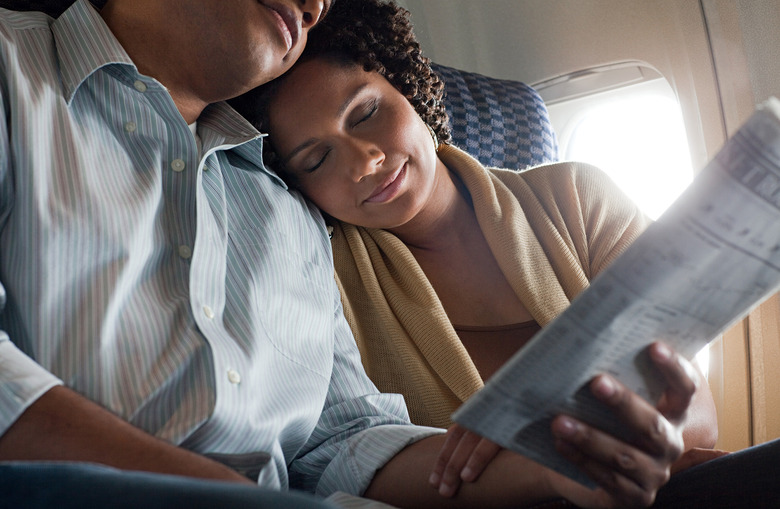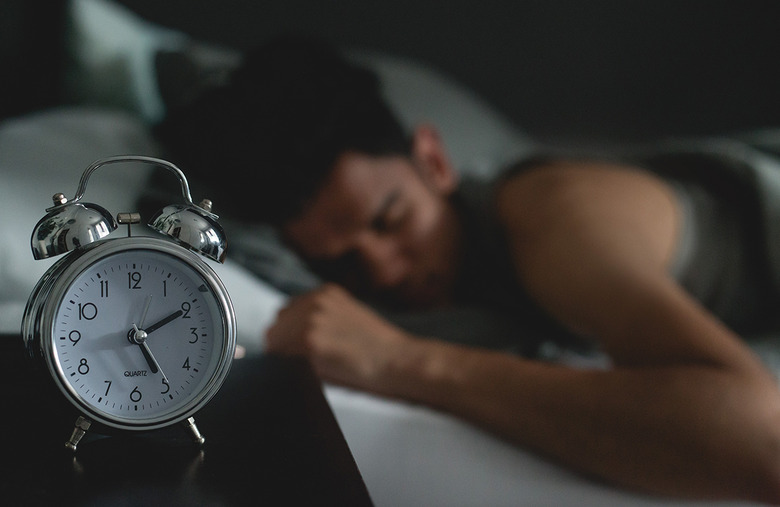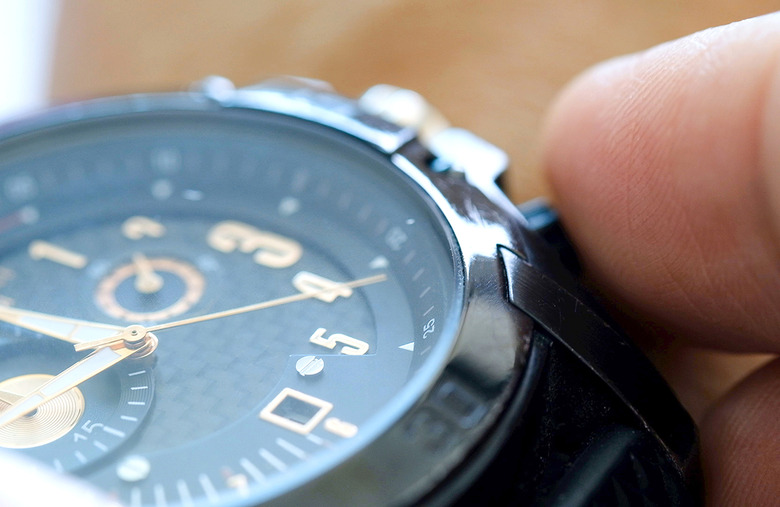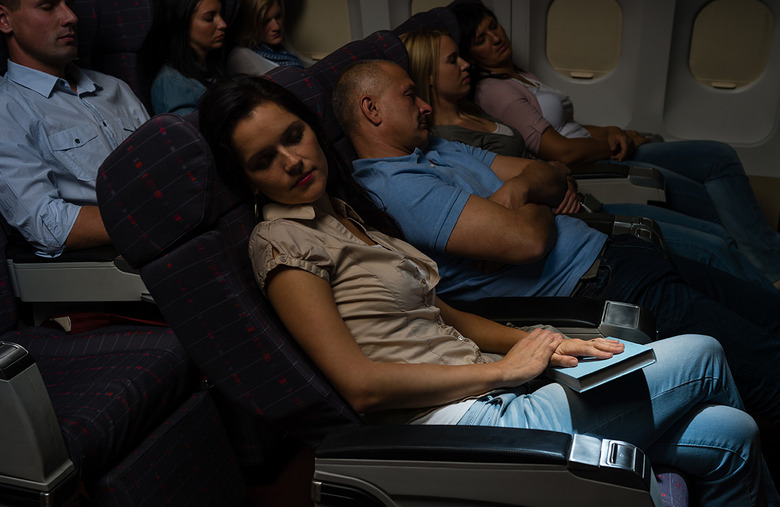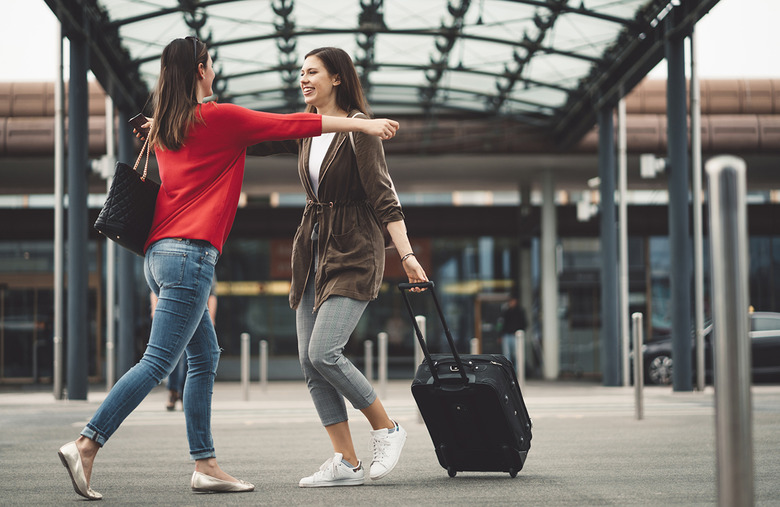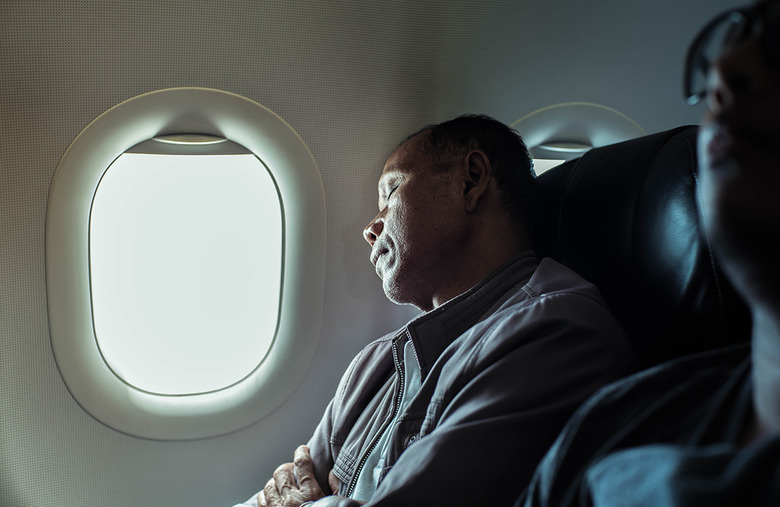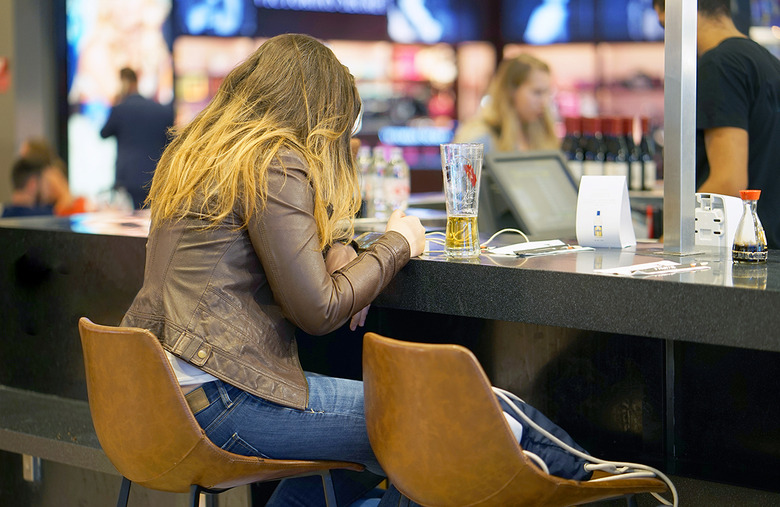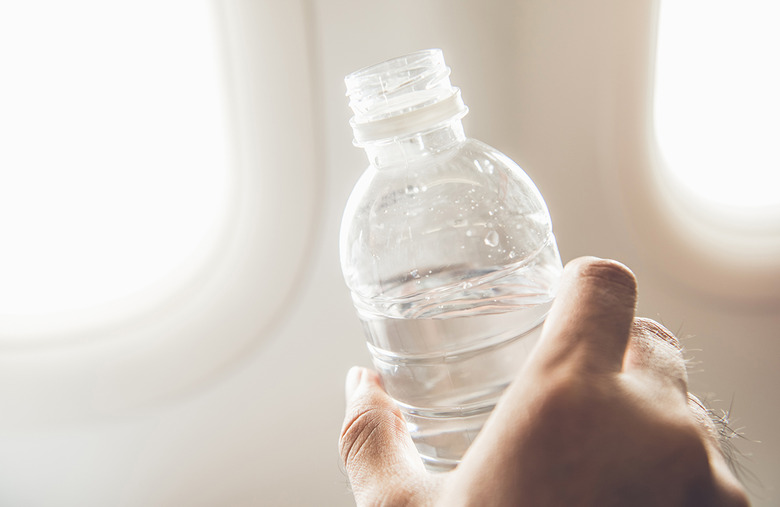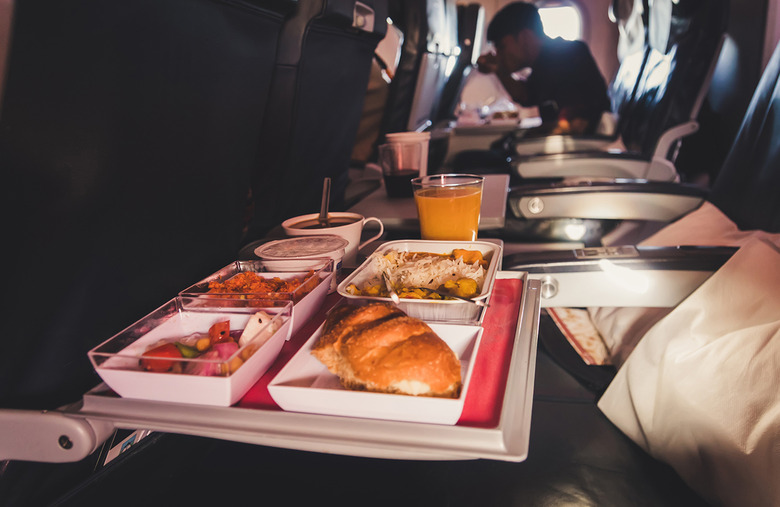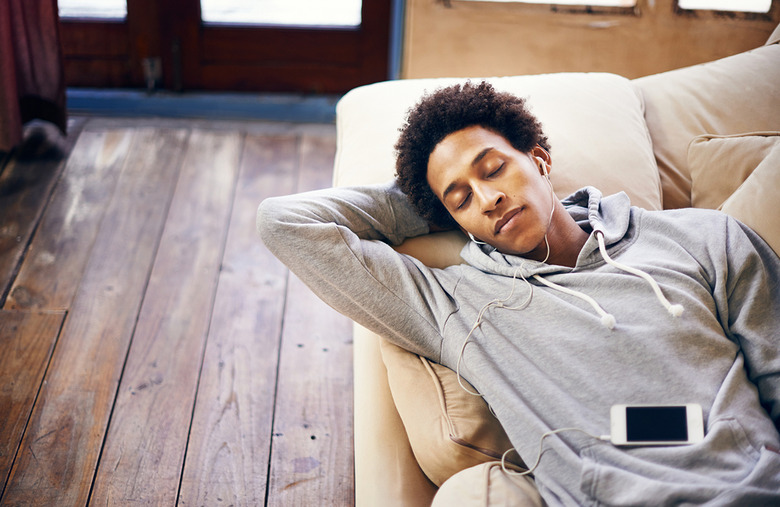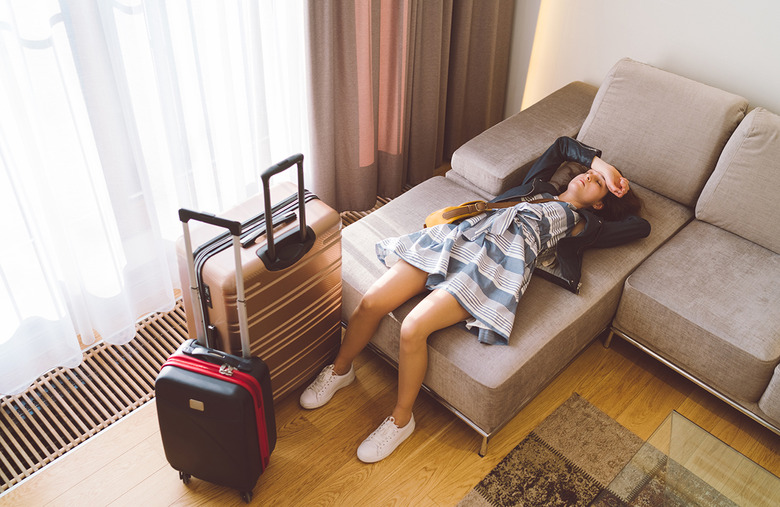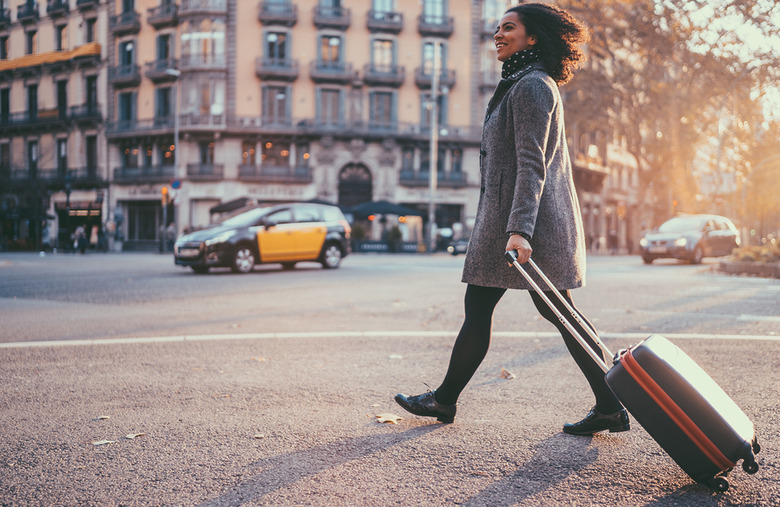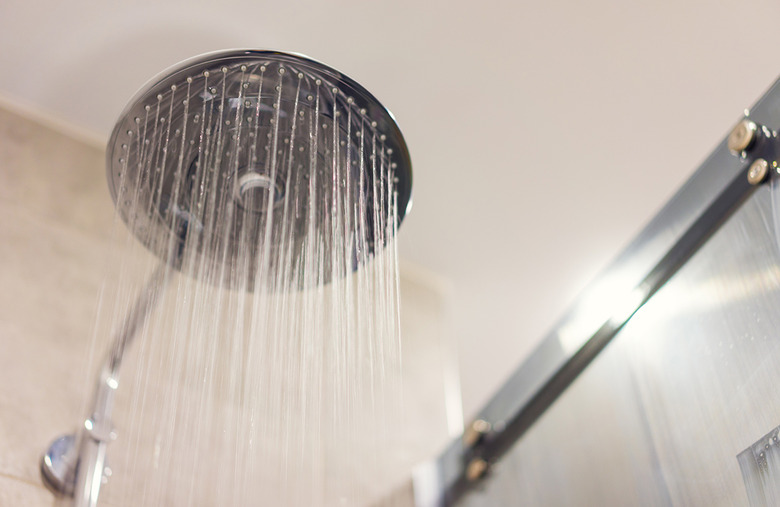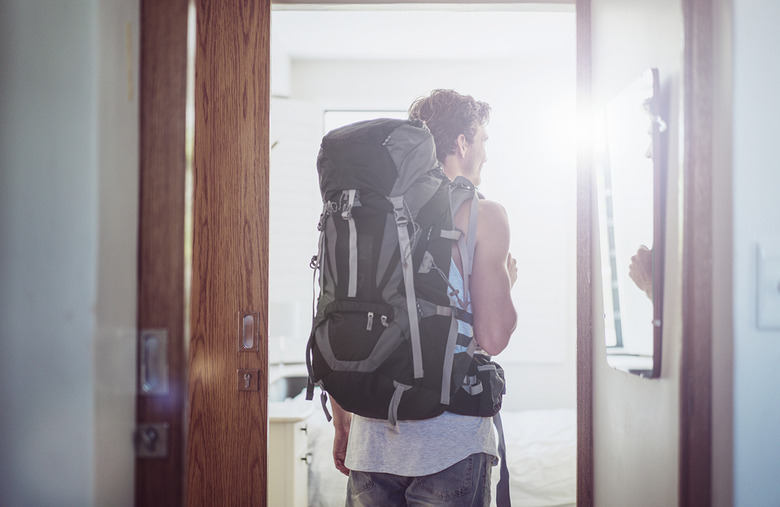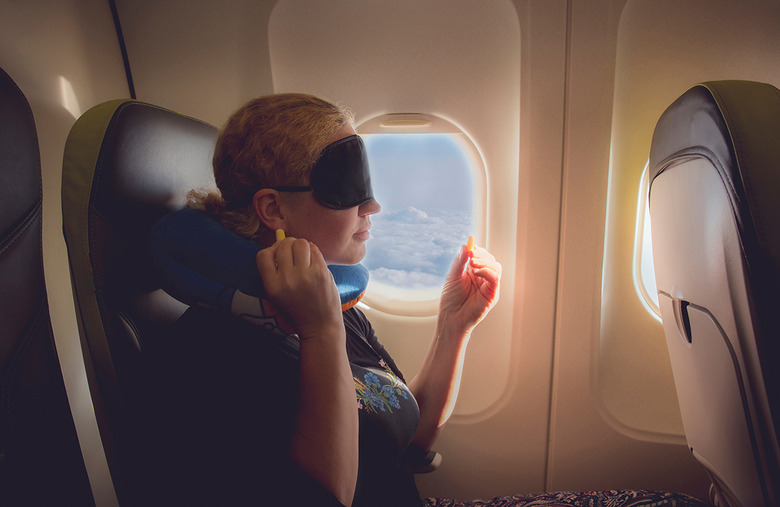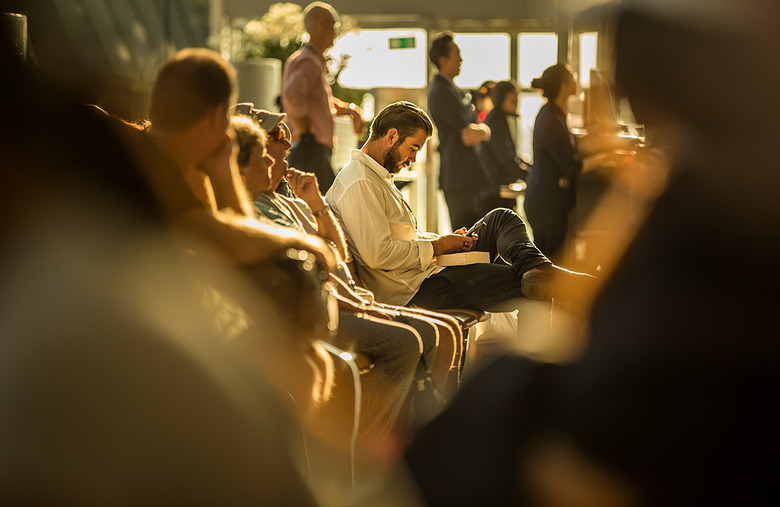20 Tips To Avoid Or Overcome Jet Lag
When going on an adventure abroad, especially one that requires a long flight, jet lag is a common nuisance. One of the weird things about flying, however, is that jet lag is not due to lack of sleep but rather the result of an imbalanced internal clock. Your circadian rhythm, the natural 24-hour cycle that dictates your sleep schedule, doesn't adjust right away to a different time zone, which means you can be sleepy during daylight hours on your trip and wide awake during the night.
In order to save your vacation and ensure you make the most of it, it's important that you do your best to prevent jet lag and overcome it when it does occur. By understanding how you can help your body acclimate better to your destination's time zone, you can make sure you have an amazing trip that leaves you well-rested.
Alter your sleep schedule beforehand
If you can, slowly start to shift your sleeping schedule toward bedtime at the destination you'll be staying in, starting three to four days before your trip. If you're traveling east, this means going to bed earlier, while if you're traveling west, you should be hitting the hay later. Just make sure you get the right amount of sleep.
Reset your watch once you’re on the plane
Start getting yourself used to your new schedule by shifting your mindset to local time at your destination as soon as you're on the plane. Keep a watch and set it to that time, so that you can eat, sleep and stay awake according to your destination's time zone. This will help you adjust psychologically as well as physically.
Fly overnight
Booking an overnight flight will make it easier for you to adjust your schedule, as you can have dinner and sleep on the plane before arriving fresh at your destination in the morning or afternoon. It's also a great way to save money on your trip since that's at least one less night of accommodations you'll have to pay for.
Arrive during the day
Ensuring that the flight you book arrives at your destination in the daytime will further help you keep to your schedule. You don't want to be wide awake at night because you just slept on the plane, and you'll also have a full day ahead of you to go out and explore local attractions.
Fly on the right plane
According to Quartzy, the structure of both the Boeing 787 Dreamliner and the Airbus A350 XWB are the most conducive to preventing jet lag. Built with carbon fiber reinforced polymer, these planes have a higher humidity level in their cabins than other airplanes, thus causing less dehydration in passengers (and making the airplane food taste better). Larger windows, higher ceilings and better air filtration also help, as do their LED lighting systems that mimic the natural light phases of the day.
Pick the right seat
Another way to ensure comfort so that you can sleep on the plane is by choosing the right seat. If you can afford it, go with an airline that you know has wider seats that recline more. First row (bulkhead) and aisle seats can let you spread out a little bit, while window seats can be a good idea because you can lean your pillow against the window and also not get disturbed when someone has to get up. Seats closer to the wing are also preferable as they tend to experience less turbulence, according to airline pilot and air travel blogger Patrick Smith.
Avoid alcohol
Alcohol isn't very good for your health, and acute high doses of alcohol can disrupt sleep in healthy people, according to a study supported by the National Institute on Alcohol Abuse and Alcoholism. This is because alcohol makes you drowsy and affects your ability to feel rested upon waking, which means it's best avoided before getting on the plane if you want to stave off jet lag.
Avoid caffeine
Found in more food and drink than you may realize, caffeine should be avoided for up to 12 hours before you travel as it can disrupt your sleep cycle and keep you awake when you might need to sleep. Caffeine can also cause dehydration, giving you dry mouth, headaches, digestive issues and bad breath.
Drink water
According to the Aerospace Medical Association, or AsMA, the humidity in a plane cabin is typically about 20 percent. Low humidity can cause dehydration, and the AsMA recommends drinking about 8 ounces of water every hour while flying in order to help prevent that.
Eat your meals on time
Another means of adjusting your circadian rhythm is with meal times, according to researchers at the MRC Laboratory of Molecular Biology in Cambridge and the University of Manchester. As soon you as you can, preferably on the plane, eat breakfast, lunch and dinner in accordance with the local time at your destination. This will help your body adjust to the new daily routine. And if you're feeling tired during the day, snacks such as fruits, vegetables or granola bars can help boost your energy to keep you awake as well as stave off hunger as your body adjusts.
Get enough rest before you leave
It's important to start off well-rested on a trip, both for your health and for your sleep cycle. Try to get all your travel planning and preparation done at least two days before your trip, so that in the 48 hours leading up to your departure, you can relax and make sure you're not so tired that you can't stay awake when you need to.
Take a power nap
If you're getting very sleepy during your trip despite all your preparation, a nap can help — but it's important to make sure you don't sleep for too long. Taking a power nap, which ideally lasts 20 minutes, will often improve your mood and increase your productivity for the rest of the day, according to a study done by the Department of Behavioral Sciences at Hiroshima University. If you sleep longer than that, you can disrupt your circadian rhythm and thus wake up feeling even more groggy and tired as well as have more difficulty sleeping later at night. "It is important to time your nap appropriately to avoid entering deeper sleep cycles," Dr. Sujay Kansagra, director of the Duke Pediatric Neurology Sleep Medicine Program, told The Active Times. "When your body enters deeper stages of sleep, or even completes a 90-minute sleep cycle in a longer nap, you are more likely to feel tired afterwards rather than refreshed."
Get some daylight
Sunshine can actually be a great way to fight jet lag, so go for a walk outside or to check out some outdoor attractions. When your eyes don't receive enough light, your brain produces melatonin, a hormone which makes you sleepy. Not only will sunshine and fresh air wake you up a bit, but it also helps to trick your body into adjusting its internal clock faster. Try to catch some sun when it's brightest out, typically in the early afternoon. If need be, a light box can also help as a means of light therapy if there isn't enough daylight outside.
Take melatonin
Melatonin has been proven effective in reducing or preventing jet lag, according to a study by the UK Cochrane Center. Since melatonin is what encourages sleep and helps your body regulate its circadian rhythm, consider taking melatonin at night. You should consult your doctor about the advisability of doing so as well as dosage to see what's right for you.
Take a warm bath or shower before bedtime
If you find that you're still wide awake or too excited to sleep once it's close to local bedtime, take a warm bath or shower. Not only is it a wonderful way to treat yourself, but the warm water will help relax your muscles. Getting out of a warm bath or shower will also cause your body temperature to drop, causing you to feel more tired and ready to sleep.
Move around during the day
Don't give yourself a chance to get too tired and sleepy by moving around throughout the day. If you're getting tired while on vacation, getting up and walking around every once in a while will help keep you alert. Not only is it a great way to help stay on schedule while flying, but it'll also help keep your circulation going if you're on a long flight.
Ask your doctor about medication
Getting enough sleep can be hard, especially if you have insomnia or an already erratic sleep schedule. As a last resort, you can talk to your doctor about any medications that are safe for you to take in order to help you sleep when you need to.
Limit blue light exposure before bedtime
We are constantly exposed to artificial "blue" light from our laptops and phone screens. Use of such devices in the evening can negatively affect your sleep and circadian rhythm for up to two nights as well as how alert you are the next morning, as found in a joint study by the Division of Sleep and Circadian Disorders at Brigham and Women's Hospital, Division of Sleep Medicine at Harvard Medical School and the Institute of Aerospace Medicine at the German Aerospace Center. This can be made even worse by jet lag, so reading before bedtime is perhaps a better alternative to checking your phone. The study found that those who did so woke up more alert.
Sleep in the right environment
Whenever possible, you should sleep in a place with as few distractions as possible. This means a dark and quiet environment as well as a comfortable temperature. Pack yourself an eye mask, ear plugs and a travel pillow and blanket in case you're in a situation where this is hard to do, such as on the plane. You can also make yourself more comfortable by booking a room at a spectacular hotel with comfortable bedding and mattresses.
Book a layover
To give your body more time to adapt to a new schedule and make the transition smoother, consider planning your trip with a layover where you can stay a day or two somewhere on your way to your final destination. Not only will this help acclimate you towards the local time zone at your final destination, but it's also a great excuse to explore another city and the extra time in-between flights can help you save money on flight tickets.
